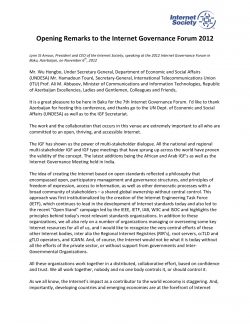Mr. Wu Hongbo, Under Secretary General, Department of Economic and Social Affairs (UNDESA) Mr. Hamadoun Touré, Secretary-General, International Telecommunications Union (ITU) Prof. Ali M. Abbasov, Minister of Communications and Information Technologies, Republic of Azerbaijan Excellencies, Ladies and Gentlemen, Colleagues and Friends,
It is a great pleasure to be here in Baku for the 7th Internet Governance Forum. I’d like to thank Azerbaijan for hosting this conference, and thanks go to the UN Dept. of Economic and Social Affairs (UNDESA) as well as to the IGF Secretariat.
The work and the collaboration that occurs in this venue are extremely important to all who are committed to an open, thriving, and accessible Internet.
The IGF has shown us the power of multi-stakeholder dialogue. All the national and regional multi-stakeholder IGF and IGF type meetings that have sprung up across the world have proven the validity of the concept. The latest additions being the African and Arab IGF’s as well as the Internet Governance Meeting held in India.
The idea of creating the Internet based on open standards reflected a philosophy that encompassed open, participatory management and governance structures, and principles of freedom of expression, access to information, as well as other democratic processes with a broad community of stakeholders – a shared global ownership without central control. This approach was first institutionalized by the creation of the Internet Engineering Task Force (IETF), which continues to lead in the development of Internet standards today and also led to the recent “Open Stand” campaign led by the IEEE, IETF, IAB, W3C and ISOC and highlights the principles behind today’s most relevant standards organizations. In addition to these organizations, we all also rely on a number of organizations managing or overseeing some key Internet resources for all of us, and I would like to recognize the very central efforts of these other Internet bodies, inter alia the Regional Internet Registries (RIR’s), root servers, ccTLD and gTLD operators, and ICANN. And, of course, the Internet would not be what it is today without all the efforts of the private sector, or without support from governments and Inter-Governmental Organizations.
All these organizations work together in a distributed, collaborative effort, based on confidence and trust. We all work together, nobody and no one body controls it, or should control it.
As we all know, the Internet’s impact as a contributor to the world economy is staggering. And, importantly, developing countries and emerging economies are at the forefront of Internet growth, with many experiencing some of the fastest rates of GDP growth in the world. And, as more Internet users come online, the “center of the Internet” will shift more and more to the developing world. This will influence the future of the global Internet. These new users are rapidly developing the innovations, efficiencies, and opportunities that will help fuel the next wave of growth, investment, and prosperity.
While the Internet governance arrangements of today have served it well over the years – the proof point is the Internet itself and its undeniable economic and social benefits. There are challenges and forces at play that have the potential to undermine the Internet’s benefit for the billions of people still to come online fully. Let’s look at just a few of these as there is a lot of work we need to do together:
For example, the advent of “big data” which affects the nature of digital identity: increasingly third parties are more likely to rely on low-assurance data from many sources to establish a reliable idea of who we are, some of which we, as the data subject, may not even know they have. And, taking this a step further, our privacy and individual liberties can now be significantly affected by inferences about us, drawn from data about others.
Privacy, trust, and identity, are social constructs and as such are highly nuanced and very highly contextual. That makes them difficult problems to “solve”. The challenge for all of us is to work collaboratively to develop the technical, legal, regulatory and cultural frameworks so that our online economy can flourish. And, we need to do this without sacrificing our legitimate and healthy social expectations of anonymity, privacy and self-determination.
Or, we can turn to the Universal Declaration of Human Rights, which still needs attention and support in many parts of the world. The Internet is an essential vehicle for promoting freedom of opinion and expression, including “freedom to hold opinions without interference and to seek, receive, and impart information and ideas through any media and regardless of frontiers,” as enshrined in Article 19 of the Universal Declaration of Human Rights. This Article encapsulates the very essence of the Internet and its borderless nature.
Yesterday, the Internet Society co-hosted a pre-event with the Association for Progressive Communication and ICC-BASIS to discuss ‘enhanced cooperation’. As you all know, ‘enhanced cooperation’ was one of the outcomes of WSIS and since 2005 we have repeated our different and diverging interpretations of what we thought the negotiators had in mind when they coined the term. In other words: we had a deadlock. Yesterday’s event was meant to bring us from deadlock to dialogue, and it succeeded in this endeavor.
We did not reach agreement of any sort, but in the spirit of the IGF, we talked and listened to each other and we think we ought to continue the dialogue on ‘enhanced cooperation’ in the framework of the IGF. This week will provide an opportunity to take this a step further and to discuss how to shape this dialogue.
The IGF can play a central role in all these areas as collaboration and mutual cooperation is essential to ensure the continuation of the Internet as an engine for unprecedentedinnovation, human empowerment, social development, and economic growth.
Thank you for the opportunity to address you today.
Lynn St. Amour, President and CEO of the Internet Society
